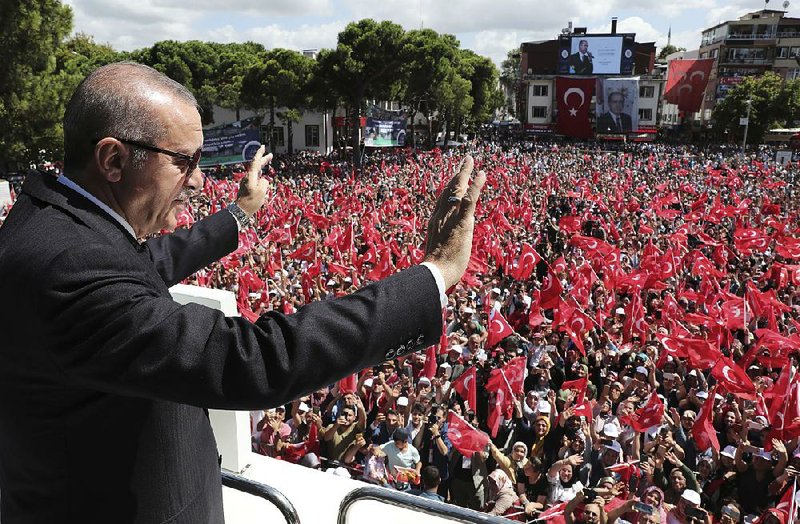Turkish President Recep Tayyip Erdogan is showing no signs of backing down in a standoff with the U.S. that has rattled markets.
"I call out to those in the United States. It is a shame. You are trading a strategic NATO ally for a pastor," Erdogan said Saturday during a rally in the Black Sea port of Ordu, referring to the U.S. decision to sanction Turkey for its imprisonment of an American priest. "You cannot tame our people with threats."
A plunge in the lira on Friday sent tremors through global markets as tensions flared between the NATO allies. At one point, the currency fell as much as 17 percent against the dollar, fanning fears that the financial tumult could infect Europe and faraway emerging markets.
The most immediate issue for Turkish policymakers is the financial system, which is exposed to interest- and exchange-rate shocks. Four people with knowledge of the matter said the banking regulator had scheduled calls with some banks on Saturday after asking them to study the potential impact. The regulator, known as BDDK in Turkish, said there was no meeting scheduled for Saturday and that the reviews were routine.
"This is a textbook currency crisis that's morphing into a debt and liquidity crisis due to policy mistakes," said Win Thin, a strategist at Brown Brothers Harriman & Co. in New York. "The way things are going, markets need to be prepared for a hard landing in the economy, corporate defaults on foreign currency debt, and possible bank failures."
Although the new U.S. sanctions served as a trigger in Turkey, many investors say the $900 billion economy was already headed toward a cliff. Years of growth-at-all-costs policy have led to runaway inflation, one of the world's largest current-account deficits, and companies saddled with hundreds of billions of dollars in foreign debt.
With the turmoil in Turkey fueling contagion fears, investors shunned riskier assets and sought safety in developed nations' bonds. Treasuries rallied, as did bunds -- Germany's equivalent to U.S. Treasury bills. South Africa's rand currency, the Argentine peso and global stocks fell. The euro sank as much as 1.2 percent to the weakest in a year against the U.S. dollar amid concern about European exposure to Turkish banks.
Interest rates are a "tool of exploitation," Erdogan said in a second speech on Saturday in Rize. "We are aware that the issue is not the dollar, euro, gold. ... These are the bullets, cannonballs, missiles of the war started against us."
Investors worry that Erdogan is standing in the way of interest-rate increases needed to stabilize the currency, and some are now saying that extreme measures are needed. Previously taboo topics like an international bailout or the imposition of capital controls are now being discussed in Turkish and international financial circles.
There were signs of alarm among Turkish citizens. Visits to three different bank branches in Istanbul on Friday indicated that requests for foreign-currency withdrawals had increased. It's not unusual for branches not to have enough foreign exchange on hand for large withdrawals, and tellers at the branches said they were awaiting cash to be delivered from headquarters to meet demand.
Speeches on Friday by President Erdogan and another by his son-in-law, the newly appointed Finance Minister Berat Albayrak, did not calm the situation. Erdogan was defiant about resisting what he calls a financial attack and requested that citizens exchange their dollars and euros for liras instead. Albayrak gave a presentation largely devoid of figures or specifics.
"Those who assume they can bring us to our knees through economic manipulations don't know our nation at all," Erdogan said in Gumushane near the Black Sea, where he was breaking ground for a new roadway. He said Turkey could achieve record economic growth in 2018, "despite all the attacks staged against our country through foreign exchange rates."
In the wake of President Donald Trump's announcement Friday that he would double U.S. tariffs on Turkish steel and aluminum, Erdogan wrote a New York Times op-ed cataloging his grievances and threatening to walk away from the nations' decades-old alliance.
"Failure to reverse this trend of unilateralism and disrespect will require us to start looking for new friends and allies," he wrote.
Ibrahim Kalin, Erdogan's spokesman, tweeted Saturday that the U.S. is "facing the risk of completely losing Turkey."
Investors now believe that Turkey's central bank will have to flout Erdogan's desires and announce a significant increase to its 17.75 percent benchmark rate just to stop the currency's free-fall as it touches levels that had been unimaginable even a month ago.
"Seems like a complete crash, so they need to act now," said Morten Lund, a strategist at Nordea Bank AB in Copenhagen. "The lira will keep falling if they don't hike rates."
On the U.S. side, Trump tweeted his analysis of the situation after new tariffs on steel and aluminum were announced: "Our relations with Turkey are not good at this time!"
Information for this article was contributed by Kerim Karakaya, Fercan Yalinkilic and Andre Janse van Vuuren of Bloomberg News.
A Section on 08/12/2018
